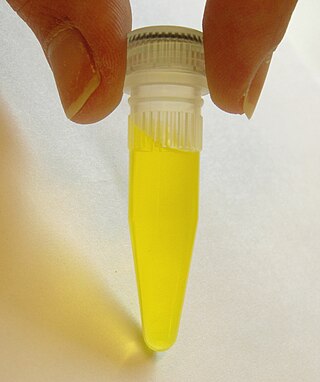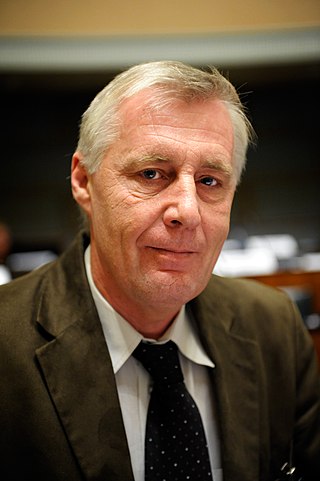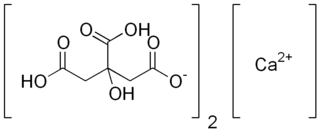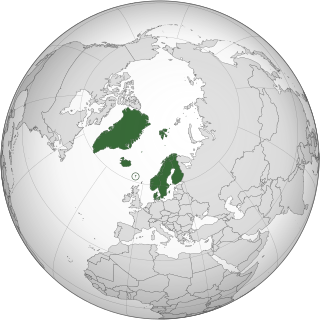
Food additives are substances added to food to preserve flavor or enhance taste, appearance, or other sensory qualities. Some additives have been used for centuries as part of an effort to preserve food, for example vinegar (pickling), salt (salting), smoke (smoking), sugar (crystallization), etc. This allows for longer-lasting foods such as bacon, sweets or wines. With the advent of ultra-processed foods in the second half of the twentieth century, many additives have been introduced, of both natural and artificial origin. Food additives also include substances that may be introduced to food indirectly in the manufacturing process, through packaging, or during storage or transport.

The Nordic Council is the official body for formal inter-parliamentary Nordic cooperation among the Nordic countries. Formed in 1952, it has 87 representatives from Denmark, Finland, Iceland, Norway, and Sweden as well as from the autonomous areas of the Faroe Islands, Greenland, and Åland. The representatives are members of parliament in their respective countries or areas and are elected by those parliaments. The Council holds ordinary sessions each year in October/November and usually one extra session per year with a specific theme. The council's official languages are Danish, Finnish, Icelandic, Norwegian, and Swedish, though it uses only the mutually intelligible Scandinavian languages—Danish, Norwegian, and Swedish—as its working languages. These three comprise the first language of around 80% of the region's population and are learned as a second or foreign language by the remaining 20%.

E numbers, short for Europe numbers, are codes for substances used as food additives, including those found naturally in many foods such as vitamin C, for use within the European Union (EU) and European Free Trade Association (EFTA). Commonly found on food labels, their safety assessment and approval are the responsibility of the European Food Safety Authority (EFSA). The fact that an additive has an E number implies that its use was at one time permitted in products for sale in the European Single Market; some of these additives are no longer allowed today.

Food coloring, or color additive, is any dye, pigment, or substance that imparts color when it is added to food or drink. They can be supplied as liquids, powders, gels, or pastes. Food coloring is used in both commercial food production and domestic cooking. Food colorants are also used in a variety of non-food applications, including cosmetics, pharmaceuticals, home craft projects, and medical devices. Colorings may be natural or artificial/synthetic.

Fumaric acid is an organic compound with the formula HO2CCH=CHCO2H. A white solid, fumaric acid occurs widely in nature. It has a fruit-like taste and has been used as a food additive. Its E number is E297. The salts and esters are known as fumarates. Fumarate can also refer to the C
4H
2O2−
4 ion (in solution). Fumaric acid is the trans isomer of butenedioic acid, while maleic acid is the cis isomer.
Acceptable daily intake or ADI is a measure of the amount of a specific substance in food or drinking water that can be ingested (orally) daily over a lifetime without an appreciable health risk. ADIs are expressed usually in milligrams per kilograms of body weight per day.

Henrik Dam Kristensen is a Danish politician and a former speaker of the Danish parliament. He has been a member of the Danish parliament for the Social Democrats from 1990 to 2004 and again from 2007, during which he served as Minister for Agriculture and Fisheries (1994–1996), Minister for Food (1996–2000), Minister for Social Affairs (2000–2001), Minister for Transport (2011–2013) and Minister for Employment (2014–2015). He served as President of the Nordic Council in 2011 and 2016.
Food Standards Australia New Zealand (FSANZ), formerly Australia New Zealand Food Authority (ANZFA), is the statutory authority in the Australian Government Health portfolio that is responsible for developing food standards for Australia and New Zealand.

Eva Kjer Hansen is a former Danish politician, who was a member of the Folketing for the Venstre political party. She held many ministerial positions, the last being as minister of Fisheries, Gender Equality and Nordic Cooperation from 2 May 2018 to 27 June 2019. Hansen was a member of parliament from the 1990 Danish general election to the 2022 Danish general election where she was not re-elected.

The Ministry of Foreign Affairs of Denmark and its overseas representations are in charge of the Danish Realm's foreign policy and relations. Among these tasks are policy towards the Arctic Council, European Union, Nordic Council, development aid, trade policy and legal affairs in relation to the outside world.

Potassium sorbate is the potassium salt of sorbic acid, chemical formula CH3CH=CH−CH=CH−CO2K. It is a white salt that is very soluble in water (58.2% at 20 °C). It is primarily used as a food preservative (E number 202). Potassium sorbate is effective in a variety of applications including food, wine, and personal-care products. While sorbic acid occurs naturally in rowan and hippophae berries, virtually all of the world's supply of sorbic acid, from which potassium sorbate is derived, is manufactured synthetically.

Polyglycerol polyricinoleate (PGPR), E476, is an emulsifier made from glycerol and fatty acids. In chocolate, compound chocolate and similar coatings, PGPR is mainly used with another substance like lecithin to reduce viscosity. It is used at low levels, and works by decreasing the friction between the solid particles in molten chocolate, reducing the yield stress so that it flows more easily, approaching the behaviour of a Newtonian fluid. It can also be used as an emulsifier in spreads and in salad dressings, or to improve the texture of baked goods. It is made up of a short chain of glycerol molecules connected by ether bonds, with ricinoleic acid side chains connected by ester bonds.

Monocalcium citrate also known as calcium monocitrate is a compound with formula C6H8CaO7. It is a calcium acid salt of citric acid. It is used as a firming agent in food, and as an acidity regulator and sequestrant.

Dicalcium citrate is a compound with formula C6H6Ca2O7. It is a calcium acid salt of citric acid.
Sør-Trøndelag University College or HiST was a Norwegian university college located in Trondheim. The school offered higher education within nursing, teaching, economics, food science, engineering and information technology. The college had six campuses throughout the city and was created in 1994 as a merger between a number of independent colleges in the city. In January 2016, HiST merged with Norwegian University of Science and Technology and Aalesund University College and Gjøvik University College.

Karen Ellemann Kloch, formerly Karen Ellemann Karabian, is a Danish politician, who serves as the current Secretary General of the Nordic Council of Ministers. She was previously a member of the Folketing for the Venstre political party. She is a former minister, having held the positions of Minister of Fisheries, Equality and Nordic Cooperation, Minister of the Environment and Minister of the Interior and Social Affairs.

The Nordic countries are a geographical and cultural region in Northern Europe and the North Atlantic. It includes the sovereign states of Denmark, Finland, Iceland, Norway and Sweden; the autonomous territories of the Faroe Islands and Greenland; and the autonomous region of Åland.

New Nordic Cuisine is a culinary movement which has been developed in the Nordic countries, and Scandinavia in particular, since the mid-2000s. New Nordic Cuisine was propelled and inspired by new ideas introduced in a manifesto written by food activist and entrepreneur Claus Meyer and a number of Scandinavian chefs in 2004 in Copenhagen. New Nordic Cuisine has been used to promote local, natural and seasonal produce as a foundation for new dishes both at restaurants and in the home. As a result, a number of restaurants, particularly restaurants in Denmark, have introduced local ingredients, some often new to the usual palate, in combination with traditional foods prepared in new ways. One notable chef who helped popularize New Nordic cuisine is Rene Redzepi, the former head chef of Noma.
Nordic Innovation is an organization under the NordicCouncil of Ministers. They to aim to make the Nordics a pioneering region for sustainable growth by promoting entrepreneurship, innovation and competitiveness in Nordic businesses.

Mogens Jensen is a Danish politician, who is a member of the Folketing for the Social Democrats political party. He served as the Minister for Food, Agriculture and Fisheries, Minister for Gender Equality, and Minister for Nordic Cooperation from 2019 to November 2020, when he was forced to resign following a botched handling of Cluster 5 resulting in an order to cull the mink population during the COVID-19 pandemic in Denmark.
















